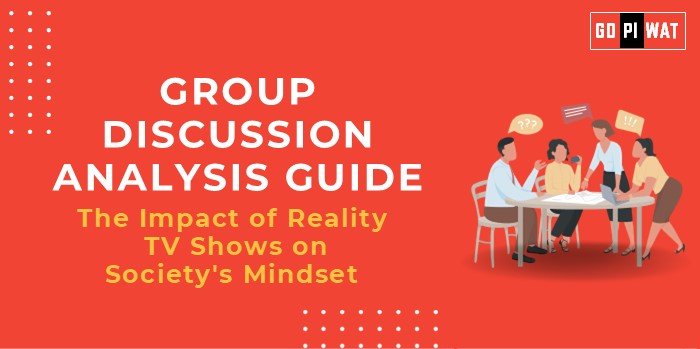📺 The Impact of Reality TV Shows on Society’s Mindset
🌟 Group Discussion (GD) Analysis Guide
🌐 Introduction to the Topic
Reality TV shows are among the most consumed entertainment genres, blending drama, competition, and voyeurism. These programs influence societal norms, aspirations, and behaviors, making them a compelling topic for debate.
📖 Opening Context
Reality TV programs such as Bigg Boss and Indian Idol have redefined prime-time television in India. They reflect a blend of entertainment and cultural commentary but face scrutiny for shaping public perceptions on ethics, relationships, and success.
📊 Quick Facts and Key Statistics
- 💰 Global Revenue: Reality TV generated $14 billion globally in 2023.
- 👩🎤 Viewer Influence: 68% of young viewers report being influenced by reality TV shows in lifestyle choices (Pew Research 2023).
- 📺 Indian Context: 45% of Indian prime-time television content consists of reality shows (FICCI 2023 report).
- 📈 Social Media Impact: Contestants experience a 300% increase in follower counts post-participation.
🏅 Stakeholders and Their Roles
- 🎥 Media Companies: Create content, often prioritizing ratings over societal responsibility.
- 🌟 Contestants: Represent diverse societal strata, influencing viewer perceptions.
- 👥 Audience: Shape content through preferences and consumption patterns.
- ⚖️ Regulatory Authorities: Ensure compliance with broadcasting norms and monitor ethical boundaries.
🌟 Achievements and Challenges
🏆 Achievements
- 🎤 Career Launchpad: Platforms like Indian Idol have launched numerous artists into fame.
- 🧠 Societal Reflection: Shows highlight issues like mental health and gender roles.
- 📈 Economic Growth: Boosts ancillary industries, including fashion, advertising, and social media marketing.
⚠️ Challenges
- 🎭 Overemphasis on Drama: TRPs often trivialize critical issues.
- 💔 Mental Health Concerns: Contestants frequently face stress and harassment.
- 🌟 Unrealistic Standards: Promotes unattainable beauty and success ideals.
🔍 Structured Arguments for Discussion
- ✅ Supporting Stance: “Reality TV democratizes fame, giving ordinary individuals a platform to showcase talent.”
- ❌ Opposing Stance: “These shows perpetuate stereotypes and exploit contestants for commercial gain.”
- ⚖️ Balanced Perspective: “Reality TV fosters inclusivity and entertainment but requires ethical scrutiny.”
📌 Effective Discussion Approaches
- Statistic Opening: “Reality TV influences 68% of young viewers, shaping their aspirations.”
- Case Study Approach: “The controversy around voting scams highlights systemic flaws in reality TV.”
📈 Strategic Analysis
- Strengths: Democratization of fame, economic boost, diverse talent representation.
- Weaknesses: Ethical issues, mental health concerns, unrealistic portrayals.
- Opportunities: Educational themes, global collaboration.
- Threats: Regulatory crackdowns, audience fatigue.
💡 Connecting with B-School Applications
- Real-World Applications: Analyzing marketing strategies and consumer psychology in reality TV.
- Sample Interview Questions:
- “How does reality TV impact consumer behavior?”
- “Should ethical guidelines govern content creation for reality shows?”
- Insights for Students: Audience engagement strategies and crisis management in media.


